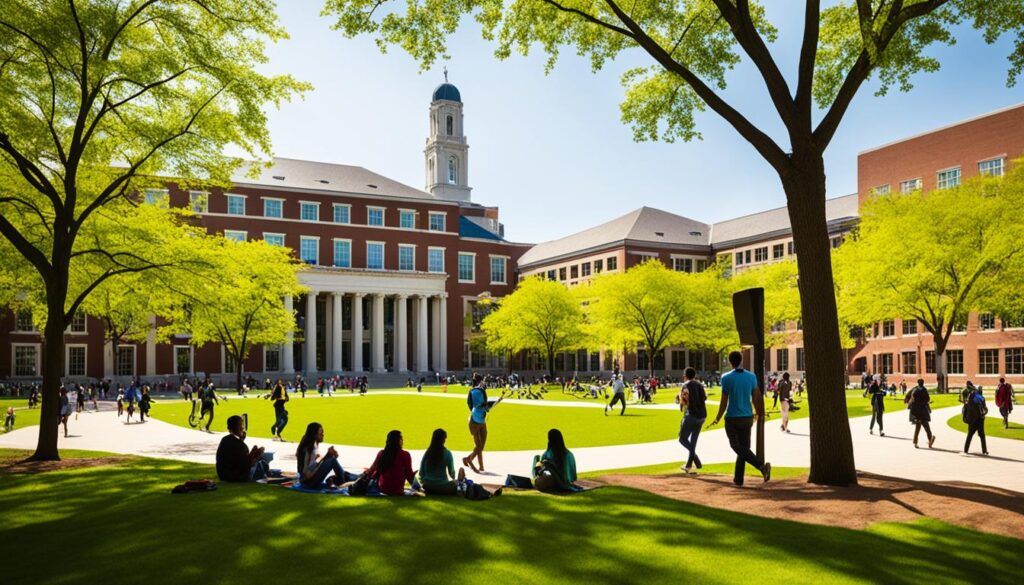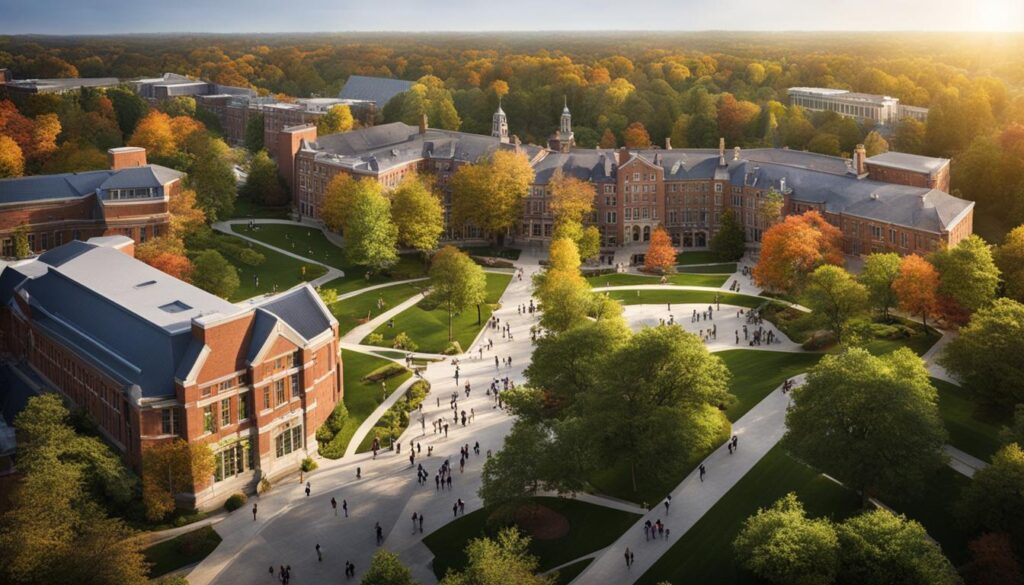When it comes to choosing the right college for your higher education journey in the UAE, one of the most important decisions you’ll have to make is whether to attend a large or small college. Both options have their own unique advantages, and it’s crucial to carefully consider what’s best for you. In this article, we will explore the benefits of both large and small colleges, helping you make an informed decision. Whether you’re looking for a vibrant campus life or personalized attention from professors, we’ve got you covered.
Benefits of Large Colleges
When it comes to choosing a college, large institutions have their own unique advantages. Let’s take a closer look at the benefits of attending a large college.
Wide Range of Academic Programs
One of the key advantages of large colleges is the extensive selection of academic programs and majors they offer. With a wide range of choices, you have the opportunity to explore different fields of study and find the perfect fit for your interests and career goals. Whether you’re passionate about business, engineering, or the arts, large colleges provide the flexibility to pursue your academic aspirations.
State-of-the-Art Facilities and Resources
Large colleges often boast state-of-the-art facilities and resources that enhance the learning experience. From cutting-edge research centers and well-stocked libraries to technology centers equipped with the latest tools, these institutions provide you with the tools and resources you need to excel academically. Access to these modern facilities can greatly enrich your educational journey and prepare you for success in your chosen field.
Diverse Student Community
Large colleges attract students from various backgrounds and cultures, creating a diverse and multicultural environment. Interacting with peers from different walks of life exposes you to different perspectives, ideas, and experiences. It fosters a vibrant and inclusive community where you can learn from one another, expand your horizons, and develop a global mindset. Embracing diversity will not only enhance your college experience but also prepare you for the multicultural workplace.

However, it’s important to consider that large colleges can be highly competitive, and you may face challenges such as large class sizes. These factors can make it more difficult to receive personalized attention from professors. It’s essential to stay proactive, seek support, and take advantage of resources available to ensure your academic success.
Advantages of Small Colleges
Small colleges offer unique advantages that can greatly enhance your academic experience. One of the main benefits is the individualized attention and support that students receive. With smaller class sizes, professors are able to provide more personalized instruction and mentoring, giving you the opportunity to deeply engage with the material and receive feedback tailored to your needs.
At small colleges, the close-knit community fosters a strong sense of belonging and connection. You will have the opportunity to develop lasting relationships with both your peers and faculty members. This supportive environment encourages collaboration, open communication, and shared learning experiences.
Additionally, small colleges often prioritize the holistic development of their students, offering a well-rounded education that goes beyond the classroom. You may have access to unique opportunities for leadership, community engagement, and experiential learning.
It’s important to note that small colleges may have limited academic programs and resources compared to larger institutions. However, they often make up for this by providing a nurturing and student-centered environment that focuses on your individual growth and success.

Campus Size Comparison of Large and Small Colleges
When comparing the campus size of large and small colleges, there are notable differences. Large colleges typically have sprawling campuses with multiple buildings, extensive sports facilities, and a wide range of amenities. They may also have larger student populations, which can lead to a bustling and vibrant campus life.

On the other hand, small colleges often have more compact campuses, with all facilities within close proximity. This can create a more intimate and cohesive community, where students can easily navigate the campus and form closer connections with their peers and faculty.
Academic Opportunities at Large and Small Colleges
When it comes to academic opportunities, both large and small colleges have distinct advantages that cater to different needs and preferences. Large colleges often boast a wide variety of academic programs and majors, opening up an abundance of choices for students. Whether you’re interested in business, engineering, or the arts, large colleges typically offer a broader range of options to suit various career paths. These institutions may also provide specialized research opportunities and collaborations with industry partners, allowing students to gain hands-on experience and make valuable connections in their chosen fields.
On the other hand, small colleges have a unique focus on undergraduate education. These institutions emphasize smaller class sizes, which foster a more intimate and interactive learning environment. With fewer students in each class, you’ll have the opportunity to engage in meaningful discussions, receive personalized attention from professors, and form close relationships with classmates. Small colleges often prioritize undergraduate research, offering students more chances to work closely with faculty members on research projects. This personalized approach can lead to a more focused and immersive learning experience.

Ultimately, the decision between attending a large or small college depends on your individual goals and learning preferences. Consider the array of academic programs, majors, and research opportunities offered by large colleges, as well as the potential for collaboration with industry partners. Alternatively, if you value close interaction with professors, smaller class sizes, and a more focused educational experience, a small college may be the perfect fit for you.
Continue reading to explore the social and extracurricular activities available at both large and small colleges, as these aspects can play a significant role in your overall college experience and personal development.
Social and Extracurricular Activities
When it comes to your college experience, social and extracurricular activities play a vital role in shaping your journey. Whether you choose a large or small college, you’ll find a wide range of options to enhance your personal growth and make lasting memories.
At large colleges, the campus comes alive with vibrant social activities. With numerous clubs, organizations, and events available, you’ll have plenty of opportunities to pursue your interests and meet like-minded individuals. From cultural clubs to honor societies, there’s something for everyone to get involved in. These large campuses often boast extensive sports teams and facilities, providing you with the chance to explore your athletic talents and be part of competitive teams.
On the other hand, small colleges may have fewer resources, but they compensate for it with a tightly knit community. These close-knit campuses foster a strong sense of camaraderie among students, creating a supportive environment where you can develop lasting friendships. With smaller student populations, it’s easier to build connections and form meaningful relationships. At small colleges, you may also have more opportunities for leadership roles and a closer connection to faculty and staff. This means a more personalized and impactful extracurricular experience that can enrich your college years and set you up for success beyond graduation.
Whatever size college you choose, remember that social and extracurricular activities are an essential part of the college experience. They allow you to explore your passions, develop new skills, and create unforgettable memories. So, make the most of the opportunities available to you, whether it’s joining clubs, attending events, or participating in sports, and embrace the diverse social fabric that your chosen college offers.
Career Opportunities and Networking
The size of a college can greatly impact your career opportunities and networking prospects. Whether you choose to attend a large or small college, each offers unique advantages that can shape your professional journey.
Career Opportunities at Large Colleges
Large colleges often have extensive alumni networks and strong connections with industry leaders. This provides students with a wide range of career opportunities and access to internships that can jumpstart their professional development. The vast resources available at large colleges, including dedicated career services offices and comprehensive job listings, can support students in their job search and help them find the perfect fit for their skills and interests.
Career Development at Small Colleges
Small colleges take a personalized approach to career development. Faculty and staff are committed to helping students explore their passions and develop skills that align with their career goals. Through individualized guidance and mentorship, students at small colleges can build strong professional networks within their chosen field. While small colleges may offer fewer immediate job opportunities, their emphasis on holistic development and well-rounded graduates can lead to long-term career success.
Networking Advantages
Large colleges often boast extensive alumni networks and connections to industry leaders. These connections can provide invaluable networking opportunities, allowing you to tap into an expansive professional community. On the other hand, small colleges foster close-knit communities where students can forge meaningful relationships with faculty, staff, and peers. This intimate environment encourages authentic networking, creating connections that can last a lifetime.
Ultimately, the right college choice depends on your personal aspirations and career goals. Larger colleges may offer more immediate job prospects and comprehensive resources, while smaller colleges prioritize personalized guidance and fostering strong professional networks. Consider your individual needs and ambitions when deciding between large and small colleges for your future career path.
Conclusion
When it comes to choosing between attending a large or small college in the United Arab Emirates, there is no one-size-fits-all answer. Both types of institutions have their own unique advantages and disadvantages, and it’s important to consider your personal preferences and priorities.
If you value a wide range of academic programs and majors, along with state-of-the-art facilities and a diverse student body, a large college might be the right choice for you. However, keep in mind that competition can be fierce and individual attention from professors may be harder to come by.
On the other hand, if you thrive in a close-knit community where professors can provide personalized instruction and mentoring, a small college may be more suitable. You can benefit from smaller class sizes, a strong sense of belonging, and opportunities for leadership roles. However, small colleges may have limited academic programs and resources compared to larger institutions.
Ultimately, the decision depends on your individual goals, learning style, and desired college experience. Reflect on factors such as academic opportunities, campus size, social and extracurricular activities, and career prospects. By carefully weighing the pros and cons, you can make an informed decision that will set you up for success in your higher education journey.
Source Links
- https://benitolink.com/2024-primary-election-18th-congressional-district/
- https://apply.tesco-careers.com/members/modules/job/detail.php?record=865455
- https://www.scu.edu/news-and-events/feature-stories/2024/stories/finding-purpose-in-a-problem.html


